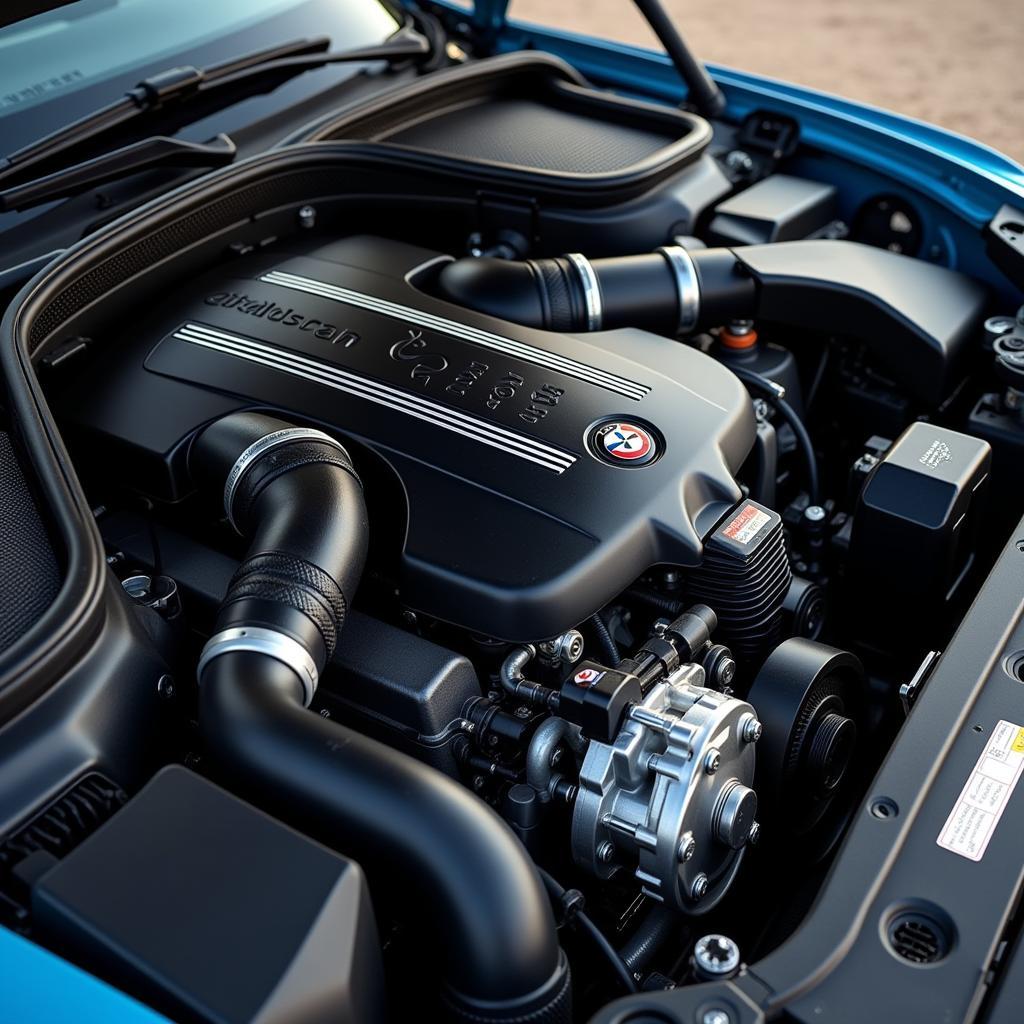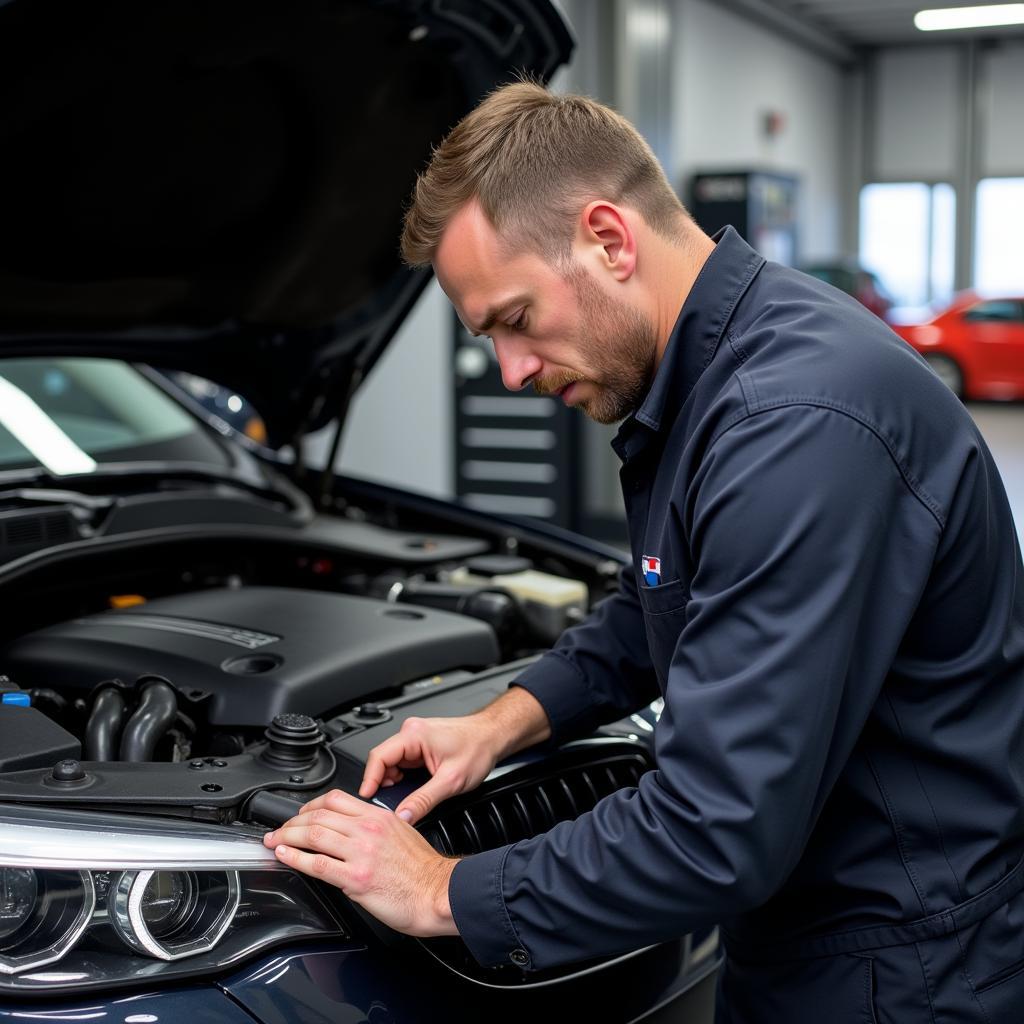Finding the Best German Car Service: A Comprehensive Guide
For many, owning a German car is a dream come true. These vehicles are renowned for their performance, engineering, and luxury. However, maintaining their high standards requires specialized care from experienced professionals. That’s where finding the right German Car Service becomes crucial.
Whether you drive a BMW, Mercedes-Benz, Audi, Porsche, or Volkswagen, this guide provides valuable insights to help you make informed decisions about your German car maintenance.
Understanding the Importance of Specialized German Car Service
German cars are engineered with precision and advanced technology, setting them apart from other vehicles. Their complex systems require specialized knowledge, tools, and expertise.
 German Car Engine
German Car Engine
Here’s why choosing a specialized German car service is essential:
-
Expertise in German Engineering: Technicians specializing in German cars possess in-depth knowledge of their unique designs, components, and functionalities. They undergo rigorous training to stay updated with the latest models and technological advancements.
-
Specialized Diagnostic Tools: German car manufacturers often employ proprietary software and diagnostic equipment. Specialized service centers invest in these tools to accurately diagnose and address issues specific to your car’s make and model.
-
Genuine Parts: Using genuine parts ensures optimal performance, safety, and longevity. Reputable German car service centers source parts directly from manufacturers or authorized suppliers, maintaining the integrity of your vehicle.
-
Preventative Maintenance: Regular servicing by specialists helps identify potential issues before they escalate into costly repairs. German cars have specific maintenance schedules, and adhering to them ensures optimal performance and longevity.
Key Factors to Consider When Choosing a German Car Service
Selecting the right service center for your German car can be daunting. Consider these factors to make an informed decision:
1. Reputation and Experience
- Online Reviews and Testimonials: Explore online platforms like Google Reviews, Yelp, and car forums to gauge customer experiences and satisfaction levels.
- Word-of-Mouth Referrals: Ask friends, family, or local car enthusiast groups for recommendations based on their personal experiences.
- Years of Operation: Establishments operating for a significant period often indicate a track record of reliable service and customer satisfaction.
 Experienced German Car Mechanic
Experienced German Car Mechanic
2. Technician Qualifications and Certifications
- ASE Certification: Look for technicians with certifications from the National Institute for Automotive Service Excellence (ASE). ASE-certified technicians have demonstrated competence in various automotive repair areas.
- Manufacturer-Specific Training: Technicians with training directly from the manufacturer of your car possess specialized knowledge and skills specific to your vehicle’s make and model.
- Continuous Education: The automotive industry is constantly evolving. Inquire about the service center’s commitment to ongoing training and professional development for their technicians.
3. Equipment and Facilities
- Specialized Tools and Equipment: Verify that the service center has the necessary tools and equipment, including diagnostic software, to service your specific German car model.
- Clean and Organized Facility: A clean and well-maintained workspace reflects professionalism and attention to detail, which often translates to the quality of service provided.
4. Transparent Communication and Pricing
- Detailed Inspections and Explanations: Choose a service center that provides thorough inspections, clearly explains any issues found, and outlines the recommended repairs.
- Written Estimates: Always request a written estimate before authorizing any work. The estimate should clearly outline the cost of parts, labor, and any additional fees.
- Warranty Information: Inquire about warranty coverage on both parts and labor for any repairs performed.
Common German Car Issues and Maintenance Tips
While German cars are built to last, they are not immune to issues. Understanding common problems can help you address them proactively:
- Electrical System Malfunctions: Complex electrical systems in German cars can experience issues with sensors, wiring harnesses, or control modules.
- Oil Leaks: Aging gaskets and seals can lead to oil leaks, particularly in older models.
- Cooling System Problems: Water pumps, thermostats, and radiators are vital components of the cooling system and may require attention over time.
 Busy German Car Service Center
Busy German Car Service Center
Here are some maintenance tips to keep your German car running smoothly:
- Adhere to the Manufacturer’s Recommended Service Schedule: Regular oil changes, fluid checks, and inspections can prevent minor issues from escalating into major problems.
- Address Warning Lights Promptly: Ignore warning lights on your dashboard at your own peril. They often indicate underlying issues that require immediate attention.
- Use High-Quality Fuel and Fluids: German cars often require premium fuel and high-quality fluids to maintain optimal performance and prevent engine damage.
Finding a Reliable German Car Service Near You
Looking for a trustworthy German car service in your area?
These links provide resources to help you find reputable service centers specializing in German cars in your region.
Conclusion
Owning a German car is an investment worth protecting. By choosing a specialized German car service, you ensure your vehicle receives the expert care it deserves. Remember to prioritize experience, qualifications, transparency, and a commitment to quality when making your decision. Regular maintenance and addressing issues promptly will keep your German car running smoothly for years to come.

